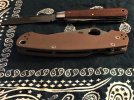- Joined
- Jan 12, 2009
- Messages
- 3,198
This reminds me of a Jack London story set in the Yukon gold rush. The greenhorns start off on the trail loaded with heavy gear, and as the miles go by they discard things bit by bit: Bowie knives, revolvers etc.
I can relate to what you wrote, and my gear is definitely minimal these days - but that wasn’t always the case!
I got a laugh out of that! Put me on that list.
I had done some medium distance hiking for years that required a couple of nights out to finish. Loved it. I decided to go for it and my BIL and myself decided to go to Yosemite to hike the trails. (Believe it or not, 30 years ago it was only seasonally crowded, not locked down due to crowds as it is now.) My BIL designed the hike and it was about 80 miles and included some pretty rugged climbing terrain at high altitude.
We were to be out for 10 days with only two overnight stops in a tent camp to prove we were alive and not lost and let the park employees check us out to make sure we were OK physically. I was so amped up I couldn't believe it. Carried 8 days of food, tent, sleeping bag, emergency gear, maps, cameras, clothes, medium duty ponchos, half size compressible mattress pads, jackets, etc. We had to plan for light freezes most night, so that was a consideration. So including pack, the total gear load out was just a smidge over 80 pounds. This was actually light all things considered because of the fact that you don't have to carry more than a quart or so of water at a time as there was water everywhere and we took our water filter kits, and we were able to take one of certain items like first aid kits, cooking pots, cooking stoves (no open fires), etc.
I had a great pack, and to make sure I got it right, I packed, unpacked, moved the load around, and cut down anything that didn't add significant value to the trip. Strategy became important as it was difficult to cut down weight after the obvious stuff (emergency fishing kit... really?) was set aside. Even to the point of planning on washing my clothes in a stream and tying them off to my pack to wave in the breeze when we hit the trail so I could carry less socks, shirts and pants.
The trip worked out pretty much as planned, and the higher the altitude got during the trip, the less food we had so it helped a bit on the weight, and to ease things a bit we started to get used to the altitude. Others, not so much.
On the trail, once we hit around 8,000 ft above sea level, we started to see all kinds of gear literally tossed off the trail. Huge car camping type sleeping bags, sporting goods type nylon "small room tents", clothes, camp chairs (really?), heavy blankets, a lot of distilled water bottles, bags with misc. stuff like tent stakes, climbing rope, empty fuel bottles, and a ton of canned goods. We could have outfitted an expedition with the stuff we found! There were long stretches of the trail where you saw no one and you had to camp out in the wild, and I think people that didn't plan just plain panicked.
It was a blast X 10 for me, but the park rangers told me the have to rescue and escort down dozens of people every year from even the easy trails. They also told me that they routinely send out the mule skinners (the only way they can realistically resupply the top most camps) to clean up all the debris left on the trails by the inexperienced hikers.
I was out all 10 days and the only cutlery I had was a 4" CASE stockman and a German (Puma made) military style sheath knife. I used the stockman quite a bit, but the Puma never left the pack.
Robert






